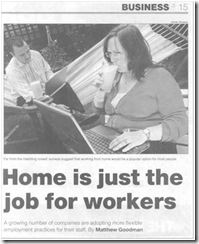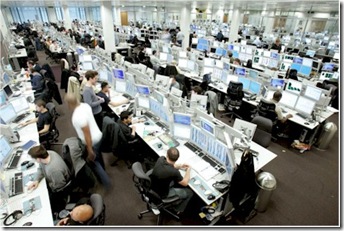The emerging realisation of business benefits to flexible work is being touted by one of the champions of emerging businesses, Dragons Den’s James Caan in last month’s Sunday Times piece titled “Technology is the key to cutting your overheads”. The sub-title goes on to assert, “The television dragon says you can find much more efficient ways of working”.
His article takes the words right out of my mouth – the power of technology, the cost benefits of flexible working, the recruitment and morale dividend, and the scrutiny over investing in physical offices…
“Some options won’t suit some businesses, but it is important nonetheless to embrace new technology to improve performance. Areas to consider might be the introduction of flexible working, outsourcing or simply better time management – all made possible by improved IT.”
If you employ 50 to 100 staff, consider the savings that could be made by introducing flexible working for 5%-10% of your employees. In return for providing them with a laptop and broadband connection you will reduce the cost of housing them in the building and the associated running costs. With advanced communication systems, an employee can be physically relocated but certainly not isolated in any way from the day-to-day operation of the business.
This level of flexibility might give you access to a different spectrum of employees, such as those who don’t wish to commute, or mothers returning to work. Flexible working might also increase productivity by allowing people to focus on specific projects, by improving time management and by generally raising staff morale through a better work-life balance…
As an investor in numerous businesses, I am able to use technology to increase the cost-effective opportunities. To help one recent acquisition secure customers all over the country, I established 10 virtual offices in leading cities across the land. Historically, I would have had to take on property, staff and significant running costs in 10 locations to present the market with the same company profile.
Today the use of virtual office facilities – a prestigious address with a mail-forwarding service and exclusive telephone number with call/message forwarding provided by a dedicated team – has created an immediate national presence without high overheads. Using this technology to present a national – or even global – operation to your customer base will cost as little as £100 a month for each virtual office. Compare this with the costs and time invested in running your “physical” offices, where the only extra value gained is the ability to interact with other employees – all other functions can now be serviced through technology.”



